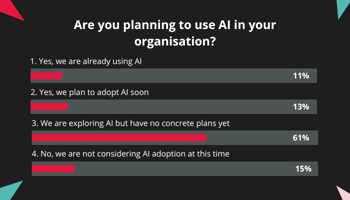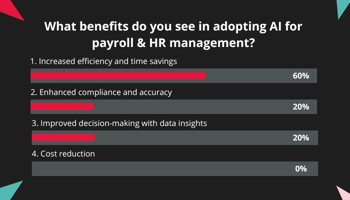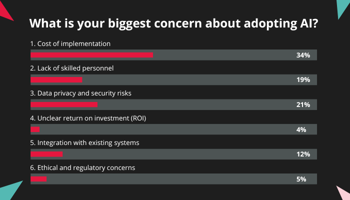In Singapore's competitive talent landscape, a troubling reality is emerging: Singapore employees rate their trust in senior leaders six percentage points lower than the global average. SMEs face significant challenges in talent management, with hiring and retention remaining top concerns for business leaders. HR professionals are caught in a storm of limited resources, growing complexity, and the need to compete with larger corporations for talent.
The hidden costs of poorly engaged workforces extend far beyond recruitment expenses. Recent research shows that many Singapore employees don't feel their company cares about their wellbeing, leading to decreased productivity, increased absenteeism, and the devastating financial impact of constant turnover. For SMEs, employee replacement costs encompass recruitment, training, lost productivity, and disrupted team dynamics.
Yet, an unexpected ally is emerging in this challenging landscape: Artificial Intelligence (AI). Far from creating a more impersonal workplace, AI is the key that unlocks deeper human connections, enabling Singapore SMEs to provide the personalised attention their employees crave while maintaining operational efficiency.
Understanding the rise of Artificial Intelligence in HR
AI adoption in Singapore's HR landscape is gaining momentum, with early adopters leading. In HR, AI is streamlining essential tasks, including trend identification, content creation, task automation, and compliance monitoring, freeing HR professionals from administrative burdens to focus on building meaningful relationships with employees.

In our recent webinar, we found that 24% of organisations are already using AI or plan to adopt it soon. This means nearly a quarter of organisations are moving beyond exploration into actual implementation.

Our poll also revealed that 60% of business leaders see increased efficiency and time savings as the primary benefit of AI adoption, followed by enhanced compliance and accuracy and improved decision-making with data insights. For these forward-thinking organisations, AI isn't about futuristic technology, it's about practical solutions transforming how organisations manage their most valuable asset: their people.

How AI can enhance your work rather than replace it?
Hear from Evan Puzey, General Manager of ERP APAC from The Access Group
However, the majority (61%) are still exploring AI but have no concrete plans yet, and this cautious approach stems from legitimate concerns. In our webinar poll, the most significant barriers to AI implementation were cost, lack of skilled personnel, and data privacy and security risks. While AI offers clear operational benefits, the hesitation reflects deeper concerns about maintaining the human elements that make HR effective. For Singapore SMEs, the key lies in understanding that AI's transformative power isn't about replacing human judgment but amplifying human capability. With government support through initiatives like the Productivity Solutions Grant, making advanced technology more accessible, the question isn't whether to adopt AI, but how to implement it in ways that genuinely enhance human connection while addressing practical concerns about cost and skills.
Want to dive deeper into these insights? Watch Experience the Future of EasyPay – The Evo Edition
Role of AI in employee retention & engagement efficiency
AI-driven tools transforming employee experience
Given the clear benefits that early adopters are experiencing, particularly in efficiency and decision-making, it's worth examining how AI specifically transforms employee retention and engagement. The modern HR toolkit, powered by AI, goes far beyond simple automation, creating a foundation for deeper human connection by handling routine tasks and providing insights that enable more meaningful interactions.
- Applicant Tracking Systems (ATS):
Today's AI-powered ATS doesn't just screen resumes—it identifies candidates who will thrive in your company culture. By analysing communication patterns, career progression, and expressed values, these systems help SMEs make hiring decisions that lead to long-term employee satisfaction.
- Chatbots for employee queries:
AI chatbots handle routine questions about leave policies, benefits, and procedures, providing instant responses 24/7. This isn't about replacing human interaction—it's about ensuring employees get immediate answers to simple questions, freeing HR professionals to focus on complex, emotional, and strategic conversations that require human empathy.
- Employee onboarding platforms:
AI-powered onboarding creates personalised experiences for new hires, adapting to their learning styles, role requirements, and cultural preferences. By automating document processing and training schedules, these platforms ensure HR teams can spend time on what truly matters: making new employees feel welcomed and valued.
Beyond automation: AI that understands emotions
The most powerful applications of AI in employee retention go beyond task automation to emotional intelligence. Instead of simply processing data or completing tasks, these advanced systems analyse human behavior patterns, communication styles, and engagement signals to provide insights that help managers build stronger, more personalised relationships with their team members. This emotional intelligence capability transforms AI from an administrative assistant into a strategic partner in human connection.
- Sentiment analysis beyond surveys:
Traditional annual surveys capture employee sentiment too late, often after disengagement. AI-powered sentiment analysis continuously monitors communication patterns, participation levels, and interaction quality to identify employees who may be struggling. This isn't about surveillance; it's about early intervention that shows employees their well-being matters.
- Personalised communication & predictive empathy:
AI analyses individual communication preferences, work patterns, and motivation drivers to help managers tailor their approach. Some employees thrive on public recognition, while others prefer private feedback. AI helps managers understand these nuances, enabling more effective and caring leadership.
- Career path visualisation:
Career growth and opportunities are among the strongest retention drivers. Given that recent research has indicated that many Singapore employees don't feel equipped to progress in their careers, AI-powered career mapping becomes crucial. These systems create personalised career paths by analysing an employee's skills, interests, performance patterns, and opportunities within the organisation.
Looking for more strategies to boost employee engagement in Singapore? Read our comprehensive guide: Employee Engagement: A Guide to Enhancing Employee Participation in Singapore for practical tips and insights.
Meet PeopleHR: The HR software that puts your people first
PeopleHR represents a new generation of HR technology that maintains humanity at its core while harnessing artificial intelligence to amplify human connection, not replace it. Built specifically for businesses that understand people are their greatest asset, PeopleHR Evo creates an intelligent, connected and secure HR suite, transforming how HR teams interact with their workforce and empowering them to focus on strategic initiatives that matter.
- Copilot:
Your AI-powered HR assistant that instantly answers HR queries or employee questions, automates repetitive tasks and delegates routine admin that would otherwise consume hours of HR time. What makes Copilot different is its ability to combine company policies with best practice advice, helping managers confidently respond to complex HR situations.
- Analytics:
When it comes to making informed business decisions, accurate and reliable data is essential. Analytics transforms employee data into actionable insights, helping HR teams understand retention patterns, engagement trends, and areas where additional support might be needed.
- Feed:
A personalised feed of tasks aggregating notifications and tasks, automatically prioritising what matters most for each employee's role. This reduces workplace overwhelm and ensures meaningful engagement opportunities don't get lost in the noise.
- Spaces:
Allow teams to create shared dashboards that help managers stay connected with their employees' progress and development needs. Rather than waiting for formal reviews, managers can spot when team members might need support or recognition, making it easier to have meaningful conversations when they matter most.
- Learning Lite:
This integrated learning platform provides employees with access to pre-installed courses on vital topics like wellbeing, internet security, and remote working. It helps SMEs meet compliance requirements while supporting employee development, showing teams that their growth and well-being are valued priorities.
Book a demo with our team to discover how PeopleHR can help empower your HR team
The human-AI partnership: How can AI help to preserve the human element in HR processes?
The most successful implementations of AI in HR aren't about replacing human judgment—they're about enhancing human capability. This partnership model ensures that technology serves people, not the other way around.
- AI surfaces insights, humans provide care:
AI excels at pattern recognition and data analysis, but it cannot replace the empathy, intuition, and emotional intelligence that define great HR professionals. The ideal partnership sees AI handling data processing and insight generation while humans focus on relationship building and care provision. While AI might identify that an employee's productivity has declined and their communication patterns suggest stress, the human HR professional reaches out with empathy and provides the support needed.
- Scalable personalization for small teams:
One of the challenges of SMEs is providing personalised attention with limited HR resources. AI enables scalable personalisation by analysing each employee's communication preferences, work patterns, and career goals and then providing HR professionals with personalised approaches for each interaction. This means a single HR manager can effectively support dozens of employees with the same level of individual care that would typically require a much larger team.
- Emotional labour support:
AI reduces the emotional labour involved in managing people by guiding difficult conversations and ensuring company values are consistently reinforced. This support doesn't replace managerial judgment but provides a foundation that makes difficult discussions more likely to succeed.
- Cultural amplification:
Strong company culture is one of the most effective retention tools, but maintaining culture can be challenging as organisations grow. AI helps by understanding how different employees respond to cultural messages, then suggesting approaches that work for each person, ensuring values are reinforced through meaningful interactions rather than generic company-wide communications.
Ethical concerns of implementing AI
While AI offers tremendous potential for improving employee relationships, its implementation must be approached with careful consideration of ethical implications. With 73% of HR leaders supporting the notion of temporarily pausing ambitious AI developments, Singapore SMEs must balance the benefits of AI insights with respect for employee privacy and autonomy.
Successful AI implementation in HR requires adherence to core principles that prioritize human wellbeing:
- Transparency:
Employees should understand how AI supports their development and wellbeing. Clear communication about the purpose and benefits helps build understanding without overwhelming people with technical details.
- Consent and control:
Employees should have control over their data and AI interactions, including the ability to opt out of certain features or request human assistance when needed.
- Human oversight:
While AI provides valuable insights, human judgement should always have the final say, especially for important decisions like performance evaluations. Regular monitoring ensures AI systems are treating everyone fairly across the organisation.
- Privacy and support-focused:
The goal of AI in HR is to provide insights that enable better support, not to create surveillance systems. When AI identifies someone who might be struggling, the response should focus on offering support rather than scrutinising behaviour.
- PDPA compliance:
Singapore's Personal Data Protection Act provides clear guidelines for responsible AI use, from collecting only necessary data to ensuring proper security measures. Compliance isn't just about legal requirements—it's about building trust with employees.
Conclusion
The future of HR in Singapore SMEs isn't about choosing between human connection and technological efficiency—it's about leveraging AI to create deeper, more meaningful relationships with employees. In a market where employee retention remains a critical challenge, the organisations that thrive will use technology to show they genuinely care about their people.
Ready to transform your HR approach from reactive to proactive? Book a PeopleHR demo today and discover how AI can help you build stronger relationships with your team while maintaining a human-centric approach.

 UK
UK
 AU & NZ
AU & NZ
 MY
MY
 US
US
 IE
IE